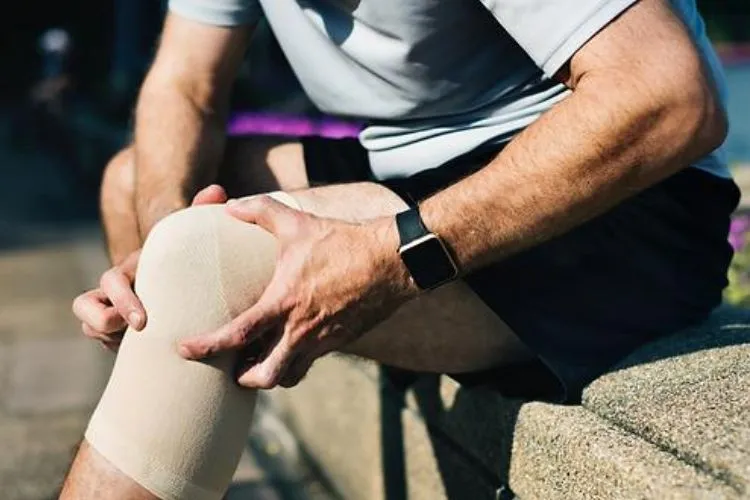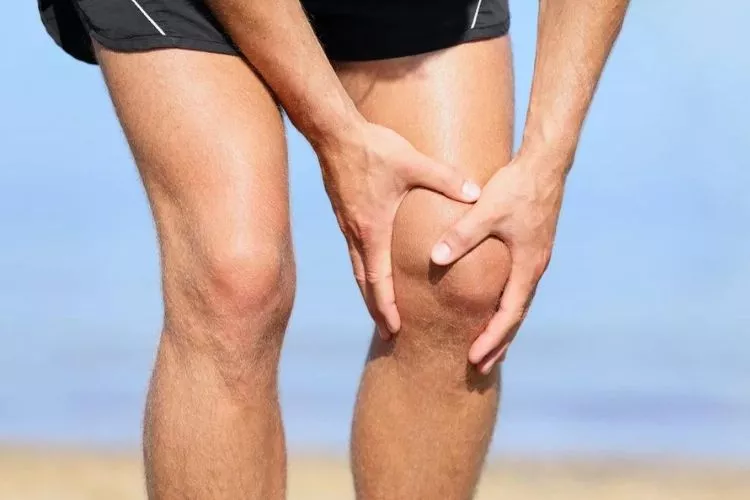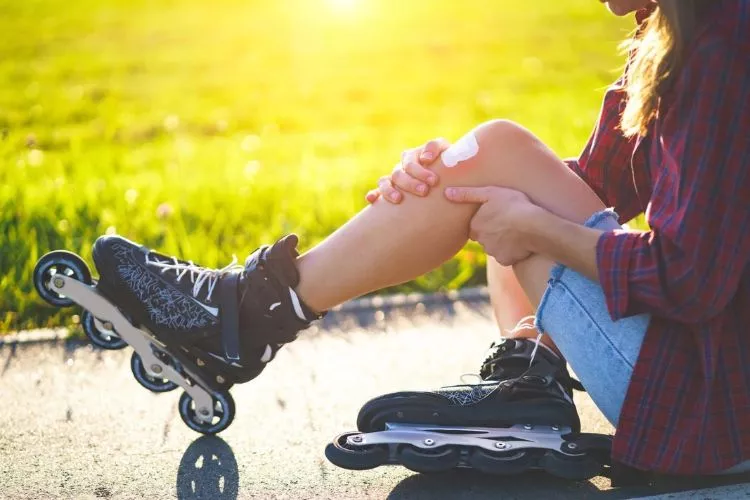Roller skating is a popular recreational activity enjoyed by people of all ages. While it is known for its numerous health benefits, there have been concerns about the impact of roller skating on knee health.
So, is roller skating bad for your knees?
In this article, we aim to separate myth from reality and provide you with accurate information on the effects of roller skating on your knees.
By understanding the anatomy of the knee joint, the forces involved while roller skating, common knee injuries, and the importance of proper technique, you can proactively protect your knees and fully enjoy this thrilling activity.

Is roller skating bad for your knees?
Roller skating can potentially be bad for your knees if you have existing knee injuries or conditions. The activity puts stress on the knees as you push off and land on each stride.
However, roller skating done occasionally and with proper form is generally considered low impact and may not negatively impact healthy knees.
Taking precautions such as using protective gear, warming up, maintaining good posture, and landing on the balls of your feet rather than heels can help reduce knee stress.
Overall, for most people without pre-existing conditions, recreational roller skating is unlikely to cause knee problems.
Understanding Knee Mechanics

Anatomy of the Knee Joint
The knee joint is a complex hinge joint that connects the femur (thigh bone) to the tibia (shin bone). It consists of structures such as the patella (kneecap), ligaments, tendons, and cartilage. Understanding the basic anatomy of the knee is essential to comprehend the impact of roller skating on this joint.
Forces on the Knee During Roller Skating
Roller skating involves dynamic movements that exert forces on the knees. These forces include compression, shear, and rotational forces. The repetitive motions and maneuvers during skating can potentially place stress on the knee joint and its surrounding structures.
Common Knee Injuries and Their Causes
While roller skating is generally a low-impact activity, knee injuries can occur due to various reasons.
Some common knee injuries associated with roller skating include patellar tendonitis, meniscus tears, anterior cruciate ligament (ACL) tears, and medial collateral ligament (MCL) sprains. These injuries can be caused by sudden twists, falls, or repetitive strain on the knees.
The Role of Roller Skating Technique
Proper technique and posture play a crucial role in minimizing the risk of knee injuries while roller skating. Learning the correct skating form, maintaining balance, and distributing your weight evenly can significantly reduce the strain on your knees.
Research and Expert Opinions

Studies on Knee Health and Roller Skating
Numerous studies have been conducted to assess the impact of roller skating on knee health. Overall, these studies suggest that recreational roller skating is generally safe for the knees when proper technique and precautions are followed. Skating on smooth surfaces and avoiding hazardous terrains further decreases the risk of knee injuries.
Expert Insights on Knee Safety
Experts in orthopedics and sports medicine recommend roller skating as a beneficial form of exercise. They emphasize the importance of wearing well-fitted skates and appropriate protective gear to reduce the risk of knee injuries.
By maintaining strong supporting muscles and listening to your body’s signals, you can enjoy roller skating safely and protect your knees.
Tips for Knee Safety while Roller Skating

Proper Skate Fit and Supportive Equipment
Before hitting the rink, ensure that your skates fit properly and provide adequate support to your ankles and feet. Ill-fitting skates can lead to instability and increase the risk of knee injuries. Additionally, wearing protective equipment such as knee pads, wrist guards, and a helmet can provide an extra layer of safety.
Warm-up and Stretching
Just like any physical activity, warming up before roller skating is essential. Engage in light aerobic exercises and perform dynamic stretches to increase blood flow to your muscles and prepare your joints for skating. Focus on stretches that target the quadriceps, hamstrings, and calves to maintain flexibility in your lower body.
Strengthening Knee Muscles
Regular strength training exercises that target the muscles surrounding the knees can help improve stability and reduce the risk of injury.
Strengthening the quadriceps, hamstrings, and gluteal muscles will provide added support to the knee joint. Exercises such as squats, lunges, and leg presses can be beneficial for knee strength.
Efficient Skating Techniques
Adopting proper skating techniques can help minimize knee strain. Keep your knees slightly bent, align your body’s center of gravity over your skates, and maintain a stable and balanced posture. Avoid excessive bending or hyperextension of the knees, as it can lead to increased stress on the joint.
Listening to Your Body
It is crucial to pay attention to any discomfort or pain in your knees while roller skating. If you experience persistent knee pain or swelling, it is advisable to consult a healthcare professional.
Ignoring or pushing through pain can worsen an underlying knee condition and potentially cause long-term damage.
Frequently Asked Questions (FAQs)
Is roller skating bad for your knees?
Roller skating, when done with proper technique and precautions, is generally safe for your knees. Taking steps to maintain knee health, such as warm-ups, wearing protective gear, and using correct skating form, can minimize the risk of injury.
How can I prevent knee injuries while roller skating?
To prevent knee injuries while roller skating, ensure that your skates fit properly, use supportive equipment such as knee pads, warm up before skating, strengthen the muscles surrounding your knees, practice efficient skating techniques, and listen to your body’s signals.
Can roller skating improve knee strength?
Yes, roller skating can help improve knee strength. The activity engages various muscles surrounding the knees, contributing to their strengthening. The repetitive motion of skating also helps build endurance and stability in the knee joint.
Are there any specific knee exercises for roller skaters?
While general knee-strengthening exercises can benefit roller skaters, there are no specific exercises exclusively for roller skaters. Exercises such as squats, lunges, leg presses, and step-ups can be included in a roller skater’s workout routine to improve knee strength and stability.
Incorporating Cross-Training for Knee Health
Benefits of Cross-Training for Roller Skaters
Engaging in cross-training activities offers numerous benefits for roller skaters looking to protect and even enhance their knee health. Cross-training refers to integrating a variety of exercise modalities, which helps in reducing the risk of overuse injuries that could arise from the repetitive motions in roller skating.
Mixing different types of exercises – such as cycling, swimming, or yoga – can provide the following advantages:
- Muscle Balance: Different activities help to work different muscle groups, promoting balanced muscular development, which can lead to better joint stability, particularly around the knees.
- Reduced Impact: Low-impact cross-training options like swimming or cycling give the joints a break from the stress of weight-bearing activities, while still enhancing cardiovascular fitness and muscular endurance.
- Increased Flexibility and Mobility: Engaging in flexibility and mobility exercises, such as yoga or Pilates, can improve the range of motion and aid in the prevention of knee injuries due to stiff or tight muscles.
- Enhanced Recovery: Varying your training can serve as an active recovery, aiding in the muscle repair process, and preventing chronic stress on the knees from constant skating.
Cross-Training Recommendations for Skaters
For roller skaters, incorporating the following cross-training activities might be particularly beneficial for knee health and overall performance:
- Swimming: A great full-body workout that is gentle on the knees and helps build cardiovascular endurance.
- Cycling: Builds leg strength and stamina without significant impact on the knees.
- Yoga: Increases flexibility, balance, and core strength, all important factors for effective and safe skating.
- Resistance Training: Focuses on building strength in supporting muscles around the knee, as well as other muscle groups utilised in roller skating.
- Pilates: Enhances core strength, stability, and postural alignment, which can lead to better skating form and reduced risk of knee strain.
Final Thoughts Before the Conclusion
Before wrapping up, it’s essential to iterate the role of proper nutrition and hydration as part of your skating regimen. Adequate nutrient intake and hydration are vital components of joint health.
Nutrients such as calcium, vitamin D, and omega-3 fatty acids support bone health and reduce inflammation, which can benefit the knees.
Also, it’s important to stay in tune with your body’s limits. Roller skating is undeniably enjoyable, but overdoing it without rest can lead to increased stress on the knees and subsequently, to injuries.
Rest days are just as important as training days, as they allow your body – especially your knees – to recover and rebuild.
By incorporating a well-rounded fitness routine that complements roller skating, being mindful of nutrition, hydration, and rest, you can help ensure that your knees stay healthy and strong, enabling you to continue enjoying the sport you love for many years to come.
Conclusion
Roller skating is a fun and exhilarating activity that can contribute to your overall physical fitness.
By understanding the mechanics of the knee joint, the forces involved while skating, common knee injuries, and the importance of proper technique, you can enjoy this activity while minimizing the risk of knee problems.
By following the tips and guidelines provided in this article, you can protect your knees and fully embrace the joy of roller skating while keeping yourself safe.
Enjoy the adrenaline rush and the freedom of gliding effortlessly, knowing that you are taking care of your knees.

Matthew James is a passionate skater who wanted to create a platform to share his love for skating with others. With a vision to create a vibrant community of skaters, he aims to provide a space where skaters of all levels can connect, learn, and grow together.
